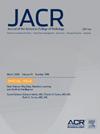A Survey Study of Patients’ Reported Preferences for Episode-Based Cost-Sharing Models
IF 5.1
3区 医学
Q1 RADIOLOGY, NUCLEAR MEDICINE & MEDICAL IMAGING
引用次数: 0
Abstract
Purpose
Episode-based cost sharing (EBCS), defined as prospectively set patients’ cost-sharing obligations for an entire episode of care, is proposed to reduce cost uncertainty for patients. The aim of this study was to assess patient preferences for EBCS for three hypothetical care episodes: breast cancer screening (BCS), lung cancer screening (LCS), and childbirth.
Methods
Adult, English-speaking Amazon Mechanical Turk workers participated in three surveys, with eligibility varying on the basis of the screening eligibility criteria for BCS, LCS, and the ability to give birth. Using a choice-based experiment, participants stated their preferred cost-sharing models for BCS, LCS, and childbirth. Selections were from nine models constructed on the basis of two attributes each with three levels: (1) initial cost (none or low, intermediate, and high) and (2) subsequently revealed additional cost if other or different medical services were needed (none, intermediate, and uncertain). Data were analyzed using hierarchical Bayesian conjoint analysis to compare preferences for EBCS (high or intermediate initial cost, no subsequent cost for additional services) versus the status quo (no or low initial cost with uncertain cost of additional services).
Results
In total, 103, 103, and 102 individuals participated in the BCS, LCS, and childbirth surveys, respectively. Across all three surveys, EBCS models were preferred over the status quo by 18.1 percentage points (95% confidence interval [CI], 17.8-18.4 percentage points) for BCS, 12.0 percentage points (95% CI, 11.7-12.3 percentage points) for LCS, and 44.5 percentage points (95% CI, 44.1-44.9 percentage points) for childbirth. Cost-sharing models with uncertain additional costs were the least preferred across all surveys.
Conclusions
Health care consumers prefer cost-sharing models that prospectively guarantee out-of-pocket costs for entire care episodes.
患者对基于事件的成本分担模式的偏好报告:一项调查研究。
目的:基于事件的成本分担(EBCS),定义为前瞻性地设定患者在整个护理过程中的成本分担义务,旨在减少患者的成本不确定性。我们的目的是评估患者对三种假设护理事件的EBCS偏好:乳腺癌筛查(BCS),肺癌筛查(LCS)和分娩。方法:成年、会说英语的Amazon Mechanical Turk员工参与了三项调查,根据BCS、LCS和生育能力的筛选标准,他们的资格有所不同。使用基于选择的实验,参与者陈述了他们对BCS, LCS和分娩的首选成本分担模式。选择来自基于两个属性构建的九个模型,每个属性有3个层次:(1)初始成本(无/低、中等、高),(2)如果需要其他/不同的医疗服务,随后显示的额外成本(无、中等、不确定)。使用分层贝叶斯联合分析对数据进行了分析,以比较EBCS(高或中等初始成本,无后续额外服务成本)与现状(无/低初始成本,附加服务成本不确定)的偏好。结果:共有103人、103人和102人参加了BCS、LCS和分娩调查。在所有三项调查中,EBCS模型比现状的BCS好18.1个百分点(95% CI 17.8, 18.4), LCS好12.0个百分点(95% CI 11.7, 12.3),分娩好44.5个百分点(95% CI 44.1, 44.9)。在所有调查中,附加成本不确定的成本分摊模式是最不受欢迎的。结论:医疗保健消费者更倾向于成本分摊模式,这种模式可以保证整个医疗事件的自付费用。
本文章由计算机程序翻译,如有差异,请以英文原文为准。
求助全文
约1分钟内获得全文
求助全文
来源期刊

Journal of the American College of Radiology
RADIOLOGY, NUCLEAR MEDICINE & MEDICAL IMAGING-
CiteScore
6.30
自引率
8.90%
发文量
312
审稿时长
34 days
期刊介绍:
The official journal of the American College of Radiology, JACR informs its readers of timely, pertinent, and important topics affecting the practice of diagnostic radiologists, interventional radiologists, medical physicists, and radiation oncologists. In so doing, JACR improves their practices and helps optimize their role in the health care system. By providing a forum for informative, well-written articles on health policy, clinical practice, practice management, data science, and education, JACR engages readers in a dialogue that ultimately benefits patient care.
 求助内容:
求助内容: 应助结果提醒方式:
应助结果提醒方式:


